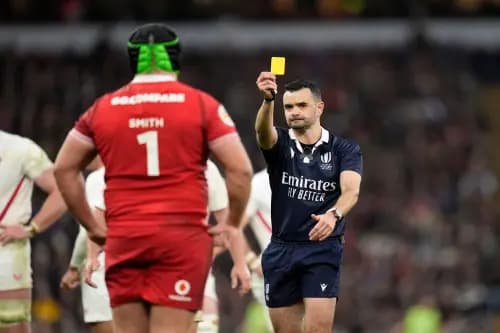Wales face Japan in Kobe on Saturday with a good deal on the line.
After all, no Japanese team have ever recorded back-to-back wins against a tier one nation.
If ever there was a rugby misnomer, then it would be to describe Wales in their current tarnished and desperate state as “tier one”.
Dan Biggar said this week that the Lions midweek selection looked “Test team-y”. In the same vein, Wales’ First Test 24-19 defeat was about as “tier two-y” as it gets.
Tier one used to consist of the eight countries who comprised the old Five Nations, plus the three southern hemisphere giants of New Zealand, Australia and South Africa, who were in the old Tri-Nations.
Italy and Argentina joined the tier when they entered their respective tournaments – an expanded Six Nations and the renamed Rugby Championship, before Japan were added to make it 11.
It used to be felt Japan were lucky to be there, but now Wales must be considered the fortunate sons. They are 14th in the world rankings, whilst Japan are 12th.
Georgia and Samoa are also higher than Wales, a team rapidly losing touch with serious rugby nations.
France lost 18 games in a row in a nine-year stint from 1911 to 1920, when the sport was in its infancy across the Channel, but Wales will surpass that figure if they lose for a 19th successive time this weekend.
How bad is 19 successive defeats? Pretty awful for the players involved, according to Wales assistant coach Adam Jones earlier this week, but for context it is worth looking at the more cut-throat world of Premier League football.
READ MORE: Matt Sherratt Backs Rookie Dan Edwards To Pilot Drifting Wales Against Japan
Only one team has suffered a longer losing run than 19 games – Sunderland, but their infamy is slightly mis-placed as that run was across two seasons, three years apart.
They lost 20 successive top flight games combined across the 2002-03 and 2005-06 seasons.
The record overseen by Warren Gatland and now Matt Sherratt is across two successive seasons, a miserable unbroken 21-month sequence that reflects the shameful state the sport has fallen into under the current Welsh Rugby Union regime.
There are those who will argue that another defeat – a 19th – would actually be the best outcome since it might finally stir revolt among the Union’s member clubs.
There is no doubt the clubs have been quiet by comparison to previous crises, perhaps worn down and wearied into a fatalistic attitude that quelled rebellion.
Whilst the WRU is still trying to work out - less still, convince – the best way to re-structure the domestic game, the defeats have kept piling up.
READ MORE: Wales Interim Coach Matt Sherratt Demands Second Test Response
Maybe one more loss might bring the whole thing crashing down, Jenga-style, and prompt a rebuild from the ruins
In the meantime, for all his popularity with the players, interim coach Sherratt is still searching for form or even identity from his team, never mind victories.
The match will also mark a significant moment for 22-year-old Dan Edwards, who earns his first start at fly-half in place of Sam Costelow.
The Ospreys playmaker has been impressive in training, said Sherratt, and did well in brief spells during the Six Nations, which begs the question of why he did not start last week.
“Dan’s trained brilliantly over the three weeks,” said Sherratt. “We want to have a look at him.”
Edwards’ ability to control the game and make sharp decisions under pressure could play a defining role in whether Wales can finally rediscover some attacking fluency.
Aaron Wainwright returns at No. 8 after Taulupe Faletau was ruled out due to cramp, while Gloucester’s Freddie Thomas will make his debut in the second row, pairing up with Teddy Williams.
Archie Griffin steps in at loosehead prop and Chris Coleman is set to earn his first cap off the bench.
Coleman played 20 matches for the Dragons last season and won once, so at least he should feel familiar in his surroundings.
READ MORE: Dewi Lake Says Wales Will Look At Themselves As Matt Sherratt's Side Wilt In Japanese Heat
Those selections at least signal a clear intent to improve the set-pieces and bring a harder physical edge to Wales’ forward play, an area where they have been found wanting in recent matches.
The challenge, however, will be considerable. Japan’s hallmark fast-tempo game, full of sharp offloads, quick rucks and intelligent movement, is likely to cause just as many problems as a week ago.
With playmakers who thrive in broken field situations and a backline capable of exposing any defensive lapses, Japan will look to impose their style from the first whistle.
Wales will need to match that intensity early on and find ways to slow the game down, perhaps through tactical kicking and physical contests at the breakdown.
While Wales will feel further anxiety, Japan have every reason to be confident.
Their game management has improved, and the balance between forward grunt and backline flair gives them a serious edge in tight contests.
For Japan, the motivation will be a chance to confirm their rise again after a lean spell and establish themselves as a consistent force in Tier 1 rugby.
For Wales, it’s a potential turning point - a moment to stop the rot and give their fans, and themselves, a reason to believe again.
With young players being blooded, the outcome could shape the trajectory of the team whenever the new permanent coach arrives.
Winning would give that new coach a base to build upon.
A 19th defeat might just throw everything into the air.






